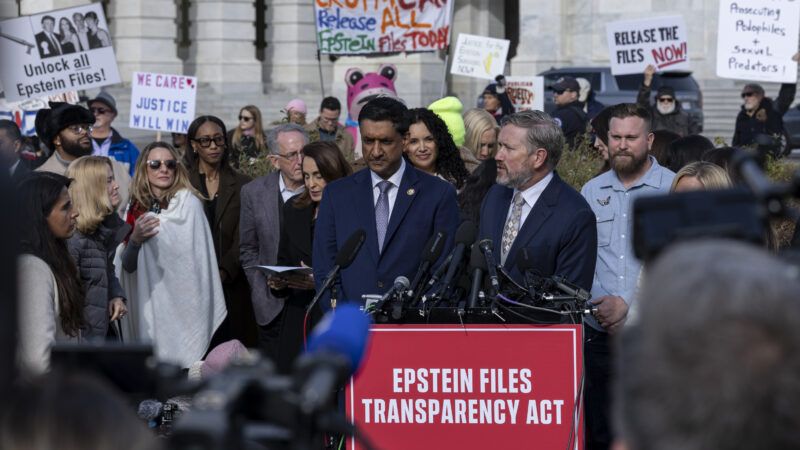Congress Votes To Open Up the Epstein Files
There probably is no “client list,” but the files could help answer some pressing questions—and open the door to more revelations.

Jeffrey Epstein continues to haunt American politics from beyond the grave. The financial manager and convicted pedophile died in 2019 while awaiting his second trial for sex trafficking. Yet a steady drip of revelations about Epstein's political ties has left the public with a feeling that there's more to the story. On Tuesday night, the House of Representatives passed a bill to release all of the Department of Justice files on the Epstein case, which the Senate agreed to pass by unanimous consent.
The libertarian-leaning Rep. Thomas Massie (R–Ky.) reached across the aisle with Rep. Ro Khanna (D–Calif.) to push for the disclosure. Speaker of the House Mike Johnson (R–La.) had tried to preempt their bill by having the House Oversight Committee launch its own investigation into the Epstein case. But a trove of Epstein's emails and text messages released by the investigators last week, some of which mention President Donald Trump, only gave Massie and Khanna's campaign new life.
"This is always something that survivors have wanted, more information about what went wrong here. Why didn't we see justice?" Annie Farmer, who was abused by Epstein at age 16 and whose sister Maria filed the first complaints against Epstein in the 1990s, told CBS News the morning before the vote. "We're just asking for the full files to be released so that we don't have to continue to live in this roller coaster world where you never know what's coming one day to the next."
Massie and Khanna's bill, the Epstein Files Transparency Act, requires the Department of Justice and the FBI to release all documents related to Epstein, his convicted accomplice Ghislaine Maxwell, any other individuals or organizations named in relation to the case, and the 2008 decision to grant him an infamously lenient plea deal, which protected "any potential co-conspirators" from prosecution. The bill gives a 30-day deadline for disclosure, with exemptions for private victim information, images of abuse, files for ongoing prosecutions, and classified national security information.
"Is there a Jeffrey Epstein Client list? Probably not. But the FBI and DOJ have a lot of files that likely contain names of people suspected of helping Epstein," Julie K. Brown, the journalist whose reporting pushed the government to reopen the Epstein case in 2019, wrote earlier this year.
The bill doesn't touch on files held by other organizations. Epstein was constantly trading favors and connections with powerful political figures in America, Britain, Israel, Russia, Qatar, and other countries. Sen. Ron Wyden (D–Ore.) has been pushing the U.S. Treasury to release Epstein's bank transactions, which he says reveal the international "financial underpinnings" of his crimes. And several intelligence sources told the British magazine Unherd that Epstein was likely being watched by the CIA's National Resources Division, whose job is to identify Americans with useful foreign ties.
Notably, Massie and Khanna's bill bans the Department of Justice from redacting information "on the basis of embarrassment, reputational harm, or political sensitivity." That line caused Rep. Clay Higgins (R–La.) to vote against the bill, the sole "no" vote in the House of Representatives. Higgins warned that releasing the names of "witnesses, people who provided alibis, family members, etc…will absolutely result in innocent people being hurt," and said he was open to supporting the bill if changes were made.
Senate Majority Leader John Thune (R–S.D.) said that the Senate will not change the bill. Once the Senate officially passes the bill—technically, senators only voted to say that they would pass the bill, since they hadn't received it from the House yet—it will go to Trump's desk. "I do want to sign," Trump told reporters on Monday, adding that he has "nothing to do with Epstein. The Democrats do. All of his friends were Democrats."
Trump called the public interest in Epstein a distraction and a "hoax." In July 2025, after months of teasing the public with the possibility of new Epstein revelations, his Department of Justice announced that it could not find a "client list" or other evidence implicating unindicted third parties in Epstein's sex abuses. A few months later, The Wall Street Journal reported that the department had a book of birthday letters to Epstein, including a letter from Trump alluding to their "wonderful secret," illustrated with a drawing of breasts.
The House Oversight Committee eventually released the birthday book. The letters suggest that many of Epstein's associates thought that he was a sexual predator and treated it as a punchline, years before he faced any kind of legal consequences.
Even if no one else is criminally charged, disclosures from the Department of Justice could help answer some other pressing, politically relevant questions about the Epstein case. Why were prosecutors initially so lenient on Epstein? Why were they keen on protecting co-conspirators such as Maxwell? Who knew what about his abuses, and when? Was there a relationship between Epstein's political connections and his apparent impunity for sex crimes?
"There's becoming a reckoning in Britain that needs to happen in the United States: a prince lost his title, the ambassador to the United States lost his job," Massie said at a press conference the morning of the vote. "We need to see those same kinds of consequences here."
